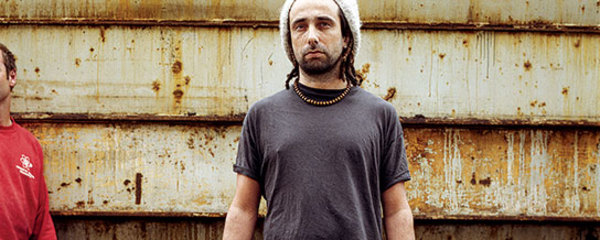Alden Tyrell: Disco Fried
While gallons of ink have been ceremoniously spilled over the music scenes of Detroit, Berlin, […]
Alden Tyrell: Disco Fried
While gallons of ink have been ceremoniously spilled over the music scenes of Detroit, Berlin, […]

While gallons of ink have been ceremoniously spilled over the music scenes of Detroit, Berlin, and Chicago, the southern Dutch shipping port of Rotterdam remains a neglected focal point of electronic innovation. But even an accidental tourist in the city would notice the extent to which electronic music permeates life on the Nieuwe Maas river. Open the door of any cab and be bludgeoned by the bellowing sound of 180-beat-per-minute gabber; pass any café with its doors ajar and galloping 808s pour out.
“It’s really nothing special,” counters dreadlocked Rotterdam artist Alden Tyrell. “It’s flat and grey and there are some guys who share the same passion for music and sitting at home-we like to complain about life and make music.”
Blasé though he may be, this electronic superman is the one-man embodiment of the city’s electronic music history. Tyrell has steadily worked his way into the pantheon of nu-disco with releases on Clone, Viewlexx, and DUB (under aliases including A Visitor From Another Meaning, Partisan Midi, Ardathbey, and with friends as EOG and Frustrated Figures). His frothy, expertly arranged take on the dancefloor-filling golden years of Italo-disco and NRG is compelling; stories of the past can be heard in every bouncing sine-wave bassline and each dramatic, synthesized woosh.
Growing up, electronic music was everywhere for Tyrell. “When I was 12, the school invited a local engineer to class who brought some synthesizers that had me totally flabbergasted,” he remembers. “And the stuff I heard on the radio sounded like it coming was from outer space.” Radio played a huge part in his formative years, introducing the young Tyrell to prodigious NRG producers like Bobby O and Claudio Simonetti. “The Hague was the Italo city,” he says. “This illegal radio station called City Radio Den Haag played non-stop disco and early electro stuff. I lived in a little suburb nearby and could just receive it on my radio.”
It wasn’t long before Tyrell purchased his first synthesizer and was playing along to tracks on his friends’ nationally syndicated radio program. “We did mixes for the Soul Show,” he recalls. “Cutting and pasting the tapes, mixing the records, and me doing the synth stuff and using a small drum computer. They thought we used samplers, but we couldn’t afford them at all as it was 1984!”
Twenty years on and reigning pop queens are once again bathing themselves in the warm light of disco, while Italo records [such as Fantasy Life’s “Over & Over” and Models’ “J.R. Robot”] fetch triple digits on eBay. This is due in no small part to the ripple effect caused by Rotterdam’s disco-loving record-label ring, which takes in the Clone empire and all its sub-labels as well as I-F’s Viewlexx imprint. “We’re all friends,” Tyrell explains of the connection. “Clone is just around the corner from my house and even closer to the studio. I-F lives in Delft, 10 minutes from Rotterdam. Like me, he almost never leaves his cave.”
Truly, Tyrell lurks in the shadows; though he frequently masters records and produces tracks, he remains notoriously reclusive. This position is about to change with the release of his first full-length, Times Like These. Gathering together sought-after singles like “Love Explosion” and “Knockers” alongside new tracks, Times (Clone) is a remarkable homage to the analog-powered euphoria of a cosmic bygone era, yet it is polished with skillful engineering and computer know-how.
Remaining true to the originators, Tyrell mostly favors old-school machinery. “I have some quite old synths and a whole range of drum machines,” he muses. “My favorite machines are the Oberheim OBXA, MiniMoog, and the Roland TR808.” But, much to his chagrin, he often must turn to higher processing speeds to get the final mixing and editing done.
“The computer is the devil,” he says. “I try to use it just as a tape recorder instead of a sound source, but it’s too tempting. The most difficult thing to handle is the fact that you can postpone all decisions you have to make while making a track-you can work on a track forever.”

